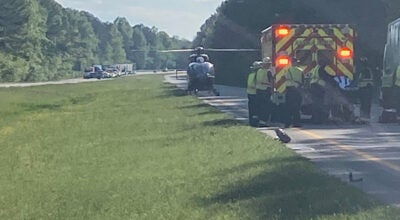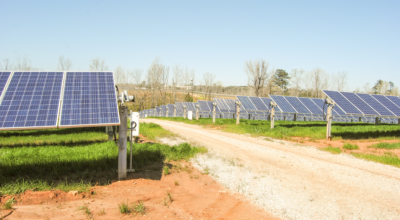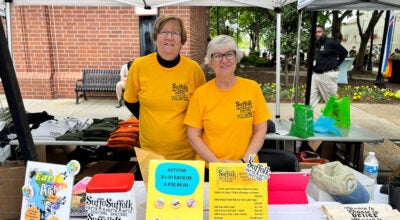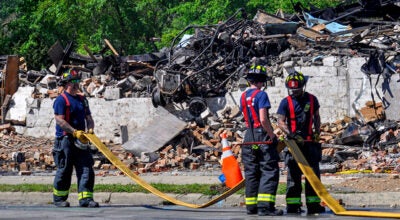Blood pressure: Check it, change it, control it
Published 10:28 pm Tuesday, March 3, 2020
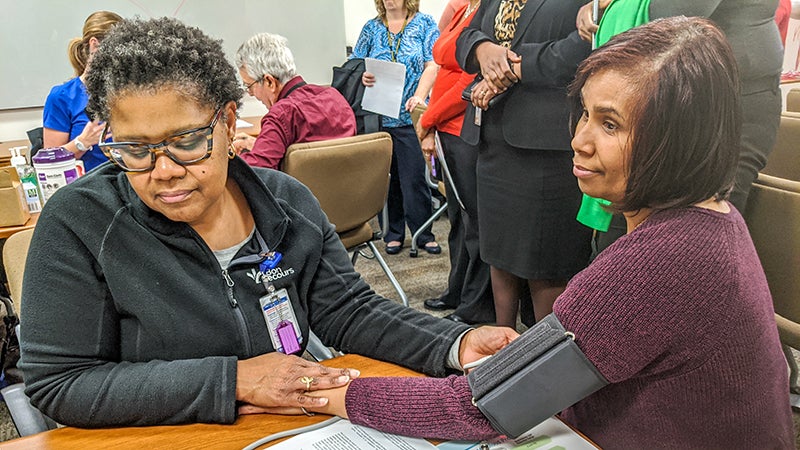
- Catina Myrick of the city’s Planning Department gets her blood pressure checked by Vondia Smithwrick-Lee, a licensed practical nurse with the Bon Secours Care-A-Van during last week’s kickoff to the four-month program “Check. Change. Control.” for city employees.
|
Getting your Trinity Audio player ready...
|
Becky Brown’s mother was diagnosed with congestive heart failure about 15 years ago while in her mid-50s.
She noted her mother had been a smoker and had a family history of high blood pressure. Because her mother did not control it over the years, it’s only gotten worse, with her heart now functioning at just 25 percent.
“It all could have been prevented with other lifestyle factors, but specifically managing high blood pressure,” said Brown, employee health and wellness coordinator for the city of Suffolk. “Just from the impact of seeing her, and being on oxygen, me being her only caregiver, working, even if you are not the one who has the high blood pressure and having trouble, it’s going to impact you and your family and everything you do.”
Brown told this to groups of city employees last week at the kickoff to a four-month program by the American Heart Association and Bon Secours Mercy Health to help them improve their heart health.
The association’s “Check. Change. Control.” program, which began last week, aims to have city employees have their blood pressure checked for free every other Thursday through June. The kickoff event gave city employees a chance to get their blood pressure checked and learn more about managing it.
In kicking off the program, MeShall Hills, executive director of the Hampton Roads chapter of the association, said more than 35 percent of all people in Hampton Roads have high blood pressure, and it is a leading risk factor for stroke and heart attack.
Hills said every 20-point increase in systolic blood pressure doubles a person’s risk of death.
“At the American Heart Association, we want to help you reduce your chances of stroke and heart attack by offering this ‘Check. Change. Control.’ program,” Hills said.
The program, which includes education on nutrition, hypertension and physical activity, is evidence-based and empowers people to take control of their health, Hills said. It involves participants having their blood pressure checked at least twice per month.
A “Check It. Change It.” program began nine years ago, and it showed when people checked their blood pressure eight times in a four-month period, systolic blood pressure decreased by 10 points. That program has evolved to the current Check. Change. Control. Program.
“So that’s how we say this is evidence-based, because we’ve done a program like this already and seen success,” Hills said.
She noted that high blood pressure is known as the silent killer because it has no symptoms and can lead to deadly consequences such as heart attacks, heart failure, strokes, vision loss and kidney damage.
More than 103 million people in the United States have high blood pressure, Hills said.
“When you have uncontrolled hypertension, you may not feel it, but it’s wreaking havoc on your organs,” Hills said.
After the age of 50, Hills said life expectancy is five years longer for those with normal blood pressure. She said 59 percent of African American men and 56 percent of African American women have high blood pressure, the highest of any race in the world.
More than 75 percent of adults over 65 have high blood pressure, and 10 percent of children ages 8 to 17 have high blood pressure. Hills suggested the percentage of children is likely higher.
Hills said she was at an event in Franklin for parents of children involved in sports, and one of the children came over and asked to have their blood pressure checked. That 10-year-old child, she said, was at hypertension stage two. She got permission from parents to check other children and found just one child out of the more than 50 they checked who had blood pressure in the normal range.
At a recent event for adults, Hills said more than 80 percent of the 300 people who were screened were hypertensive.
“This is a problem,” Hills said. “This is an epidemic. We’re looking right now at what’s going on with the (coronavirus). This is also an epidemic. … This kills more people than any virus that’s out there, so we have to take this serious.”
Andrew Braisted, Bon Secours’ administrative director of cardiovascular services, stressed prevention to the groups of employees who stopped by the city’s Human Resources office.
“Every month we have a meeting at our hospital where we talk about how we can shave minutes off the time that, if someone had a heart attack right now here in this room, how many minutes it would take to get you to the cath (catheterization) lab and get that vessel opened up,” Braisted said. “But that’s all work, effort on that back end, way downstream, it’s too late. This is the exact kind of initiative we want to get involved in, because it’s upstream.”
Blood pressure guidelines
Blood pressure: Systolic mm Hg (upper number) and Diastolic mm Hg (lower number)
Normal: Less than 120 and less than 80
Elevated blood pressure: 120-129 and less than 80
High blood pressure (Hypertension) Stage 1: 130-139 or 80-89
High blood pressure (Hypertension) Stage 2: 140 or higher or 90 or higher
Hypertensive crisis (consult doctor immediately): Higher than 180 and/or higher than 120
Suggestions to improve blood pressure
- Lose weight and maintain normal body weight
- Eat a diet rich in fruits, vegetables, low fat dairy and reduced in fat
- Restrict sodium intake to less than 1,500 mg per day
- Be more physically active, aiming for 90 to 150 minutes of aerobic exercise per week
- Moderation of alcohol consumption — no more than 2 drinks per day for men and 1 per day for women
Source: American Heart Association
Note: mmHg stands for millimeters of mercury


